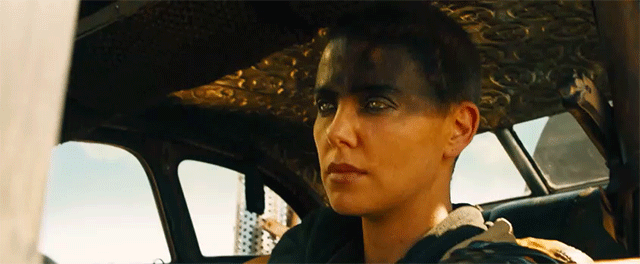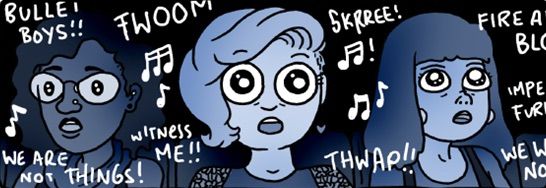Her movie, his name;
Mad Max: Fury Road

Wherein I gather together some of what has been said about Mad Max: Fury Road.
(Top gif via @beep)
knocks on your door Hello Friend, have you heard the good news about MAD MAX: FURY ROAD? (@hazbaz)
There are two reasons why I loved Fury Road.
-
I’ve always been a Mad Max fan, ever since I was a kid, and this movie made me feel like the series had matured with me. Beginning with a crude and crass—simplistic—view of the world and evolving over time into something more reflective, more mature, and more inclusive.
-
It showed us what the lowest common denominator for an action movie should be. It does the job well without denigrating women or minorities.
It’s the difference between going to the movies knowing that you will be safely entertained and going there feeling that you are the entertainment—that you and people like you are things that exist only to feed the needs of others or to be mocked.
There needs to be safe spaces for female audiences, where they can trust the movie/show won’t throw sexualized violence in for shock … AND WITH THAT, knowing that any violence against women will be handled well. We don’t have enough of those spaces. Which is why Fury Road is being heralded the way it is. Women get hurt. Women die in that movie. But it’s never done cheaply. (@JustPlainTweets, 2, 3)
Note: FURY ROAD is an R-rated movie w/ a sexual slaver villain yet Miller & co. didn’t feel the need to include a rape scene. (@saladinahmed)
It says a lot about our culture that this low a bar is so rarely passed.
Interesting female characters aren’t propaganda. Women are people and people are interesting. Boring female characters are propaganda. (@travisbeacham)
“There’s a feminist cabal in the entertainment industry!” looks at all dude-centered stuff Um…if there is, they’re on holiday (@GigawattConduit)
Man I tell ya, if all it takes is seeing someone in the media to “turn you” into whatever they are, there’d be a lot more straight white ppl (@kateleth)
Most blockbuster action movies are so predictably awful about these issues that a drinking game based on their annoying tropes would leave you unconscious before the first act ended.
My point is, pop culture too often lets us down. Sometimes it’s big — you fail the Bechdel Test, say. Sometimes it’s minor. Every time we notice this, we can either tear our hair out and groan and feel sad, or we can channel this energy into a drinking game.
I started playing this game when I watched “Avengers: Age of Ultron.” It made the movie a lot better.
The sad feminist summer blockbuster drinking game by Alexandra Petri (1167 words).
The fact that Fury Road is an extremely competent passing of that bar doesn’t hurt either.
And that’s more or less it: enjoy the ride! Notable for being absent are things we wouldn’t even notice were we not programmed to expect them served up with the old Hollywood ultraviolence: think impossible acrobatics, sad villain backstories, and female objectification. Especially in the latter case, you won’t miss these things, unless they were the things you came to see.
Mad Max: Fury Road by Rob Beschizza (945 words).
First of all, is this a film that holds up against the original series? Is it the action packed, fuel injected, chromed out post-apocalyptic vehicular mayhem tale worthy of bearing the name? Yes. Unquestionably, unequivocally: YES. This is a film that never stops. From the very beginning until the end there’s no pause, just a shifting of gears. It’s an unrelenting, frenetic action piece. Gloriously shot and edited. Full of incredible set pieces and props and character design.
Review: Mad Max - Fury Road by @m1k3y (2140 words).
Just Plain Something’s review.

And it has the obligatory Mad Max ‘world gone mad’ plus vehicular mayhem moments.
Saw Mad Max. It’s a post-apocalyptic insane clown posse dune cirque du soleil. (@shanselman)
There are moments, though, in the movie that really do highlight how different it is.
That moment with Max, Furiosa, & the rifle? I don’t know that we’ve ever seen a moment like that played straight in mainstream action film. Max’s deference to Furiosa in FURY ROAD doesn’t invalidate his badassery - it’s PART of it. Smart enough to know who should take which shot. (@saladinahmed, 2)
And it terrifies me that this is different, that this is unusual. That this would be controversial—the idea that some people are irrational enough to take offence at one character recognising another as more competent for that particular task—is worrying.
Especially when it’s simply a very solid and rational scene in the movie. Max at that point has been traumatised, battered, and has literally had the blood sucked out of him. Moreover, it’s been made clear that Furiosa is one of a minority in that world with relatively free access to firearms, which means she’s much more likely to be in good enough practice to be able to make the shot. It’s a small moment but stands out because it’s one where, in most action movies, irrational tropes would trump consistency and sound story-logic.
But that’s not the only ‘deviation’ from Hollywood norms that Fury Road takes. George Miller takes characters that are normally invisible—women over a certain age—and makes them visible. No, scratch that. He makes them badass.
“These women are now in their 60s and 70s and to have survived, I mean, the most efficient way to get around a wasteland is on motorbikes … And they’re warrior women.”
“We’re a badass lot, yeah,” says actress Melissa Jaffer. “I mean, my character is no doubt a killer.” Jaffer is a well-known Australian actress who plays the eldest of the warrior women. Her character carries hope for the future in a satchel filled with plants and seeds.
The 78-year-old Jaffer says she and the other actresses did their own stunts. "And I got feeling from a lot of the crew members that they didn’t think it was right women of my age to be doing that sort of thing.
The Women Pull No Punches In Fiery, Feminist ‘Mad Max’ by Mandalit del Barco (879 words).
(Some of you may remember Melissa Jaffer from Farscape, where she played Noranti in the later seasons. She was also excellent there.)
The inclusion of the warrior women in turn reminded me of the grandmother hypothesis. Which Athena Andreadis explains well in this blog post (read it, it’s good).
The grandmother hypothesis postulates that the presence of grandmothers allowed more children to reach adulthood, because grandmothers not only foraged for their daughters’ older offspring but also socialized them, taught them important skills and transmitted knowledge and experience. It also postulates that older children had to develop ways to compel caretaker attention, giving rise to the enlarged frontal lobe unique to humans. So the hypothesis argues that female longevity is essentially a “quality over quantity” fitness adaptation that in turn favored descendants of women who fit this profile.
Grandmothers Raise Civilizations by (922 words).
That the grandmother hypothesis is relevant to the inclusion of older female characters in Fury Road—a story about a post-apocalyptic world in the need of rebuilding—should be obvious.
So, in short, go see Fury Road. It’s an excellent action movie where you don’t have to worry about feeling the grunch of witnessing gratuitous sexual violence. It starts fast and doesn’t stop. We need more like it.